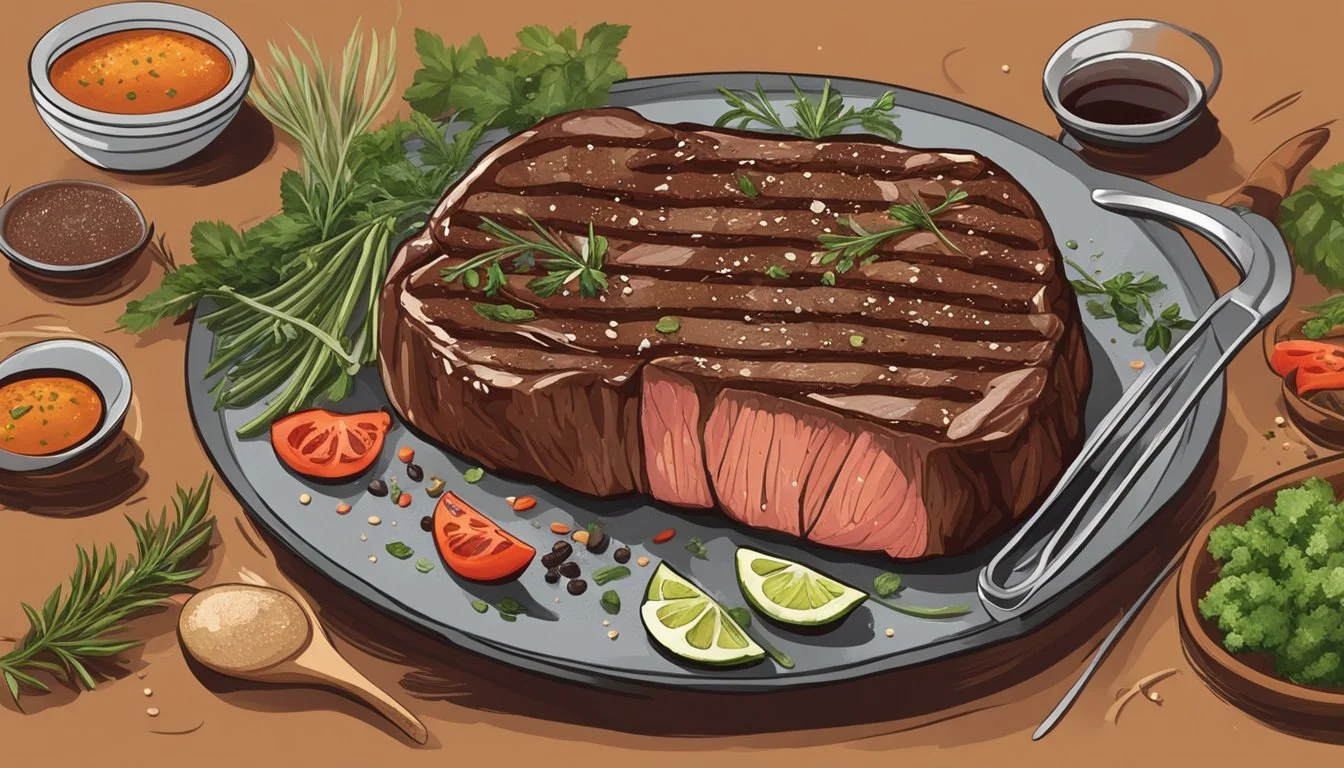Worcestershire Sauce Carnivore Diet
Enhancing Meat Dishes with Classic Flavors
The carnivore diet has sparked much interest for its unconventional approach to eating, focusing exclusively on animal products. This diet includes all types of meats, seafood, organs, eggs, and certain dairy products like milk, cheese, and heavy cream. While some fruit, honey, as well as coffee, tea, and select herbs and spices may be optionally included, the core principle is simple: consume only foods from animal sources.
Considering the dietary restrictions, adherents often ponder the suitability of various condiments to enhance the flavor of their meals. Worcestershire sauce, a complex sauce with a savory profile, frequently used to enrich the taste of beef dishes, invariably comes into question. It is critical to assess the ingredients of such condiments given the carnivore diet’s stringent guidelines against sugar and additives.
Worcestershire sauce contains elements that fall outside the animal-based category of the carnivore diet, such as sugar and tamarind extract. As such, individuals on the diet must carefully consider whether to include it in their regimen. While the sauce offers a low-calorie option to add depth to dishes, it does not align with the carnivore diet, which seeks to minimize or eliminate plant derivatives and sugars. This characteristic positions Worcestershire sauce at odds with the diet's principles, prompting those committed to the carnivore lifestyle to seek alternative flavoring options that maintain diet integrity.
The Carnivore Diet Explained
The Carnivore Diet is a restrictive regimen focusing predominantly on animal products and is regarded by proponents as a potential means to address certain health issues through its low-carb, high-fat dietary framework.
Definition and Core Principles
The Carnivore Diet is a dietary approach that involves consuming exclusively animal products. At its core, this diet comprises a high-protein, high-fat, and low-carbohydrate approach to nutrition, emphasizing meats, especially ruminant meat which includes beef, lamb, and goat due to their single-ingredient nature.
Meat: Primary source of food; includes all types of animal flesh.
Organs: Highly encouraged within the diet; considered nutrient-rich.
Dairy: Acceptable if tolerated; preference for high-fat, low-lactose options.
Carnivore Diet Foods
Animal products are the cornerstone of the Carnivore Diet, with meat fundamentally comprising the bulk of food intake. Individuals who follow this diet consume:
Ruminant meats: beef, lamb, goat
Poultry and pork: secondary options
Organ meats: liver, heart, kidneys (nutrient-dense)
Seafood: fish and shellfish
Animal fats: tallow, lard
Eggs
Select dairy products: butter, cream (in moderation for strict carnivores)
I always prefer buying tallow or lard online because of the added convenience!
Benefits and Risks
Advocates of the Carnivore Diet claim several health benefits, including a fortified immune system, alleviation of certain health issues, and potential slowing of aging processes due to the diet being high in animal fats and proteins. Though high in nutritious fats and proteins, the diet’s restrictive nature poses risks such as nutritional deficiencies and potential exacerbation of certain health conditions. It is crucial for individuals to consult healthcare professionals before adopting such a diet.
Worcestershire Sauce Origins and Composition
Worcestershire sauce is a complex condiment with a rich history and a distinctive blend of ingredients that contribute to its unique flavor profile. Its culinary uses are varied, making it a versatile addition to many dishes.
Historical Background
The creation of Worcestershire sauce can be traced back to the town of Worcester in Worcestershire, England, during the early 19th century. It was developed by John Wheeley Lea and William Henry Perrins, who were pharmacists. The sauce is known for its lengthy fermentation process, often taking 18 months, and traditionally matured in wooden barrels similar to how some spirits are aged.
Ingredient Profile
The robust flavor of Worcestershire sauce arises from its diverse ingredient profile, which includes:
Vinegar: Provides a tangy base to the sauce.
Molasses and Sugar: Offer sweetness to balance the acidity.
Anchovies: (What wine goes well with anchovies?) These small fish add a distinctive umami flavor.
Tamarind Extract: Gives a sour and fruity tang.
Salt and Garlic: Enhance the sauce's savory qualities.
Spices and Herbs: Often includes cloves and other seasonings, though specific blends can vary.
This combination of ingredients, especially the fermented anchovies, links the condiment to ancient traditions, like the garum used in Rome, which also utilized fermented fish.
Culinary Uses
Worcestershire sauce is not only used to season steaks but is an essential ingredient in a variety of dishes:
Cocktails: Integral to the Bloody Mary.
Salads: Upgrades Caesar salads with its tangy taste.
Meats: Elevates the flavor of beef and oysters.
Snacks: An ingredient in deviled eggs and party mixes.
Its utility extends to marinades, sauces, and as a general seasoning, providing a quick way to deepen flavors in a multitude of recipes.
Carnivore Diet and Condiments
When adopting a carnivore diet, the use of condiments may come into question due to their potential ingredient conflicts. The focus is typically on single-ingredient, minimally processed items to complement the high-protein, animal-based food intake.
The Role of Condiments in the Diet
Condiments can enhance the flavor of meals, making the carnivore diet more palatable and enjoyable. They serve to diversify the taste profile of meats, which are the cornerstone of this diet. It's important, however, that these additions align with the diet's principles, primarily avoiding carbohydrates and additives.
Common Carnivore-Friendly Flavorings
Single-Ingredient Additions:
Salt: Enhances natural flavors; vital for electrolyte balance.
Fresh Herbs: Such as rosemary and thyme; provide aromatic qualities.
Lemon Juice: Adds zest without compromising the diet's framework.
Butter: Offers richness; preferable if from grass-fed sources.
Mayonnaise: Made from egg yolks and oil.
Condiments: Those recreated at home using simple, carnivore-compatible ingredients.
Preferred Sauces:
Fish sauce: Typically contains just anchovies and sea salt.
Mustard: Often single-ingredient, but without added sugars.
In the carnivore community, one also occasionally sees the use of hot sauces, provided they have zero or negligible carbohydrate content, and soy sauces that are traditionally fermented and additive-free.
Avoiding Unwanted Additives
A central tenet of the carnivore diet is to steer clear of sugars, unhealthy fats (such as industrial seed oils), and artificial additives. Many store-bought condiments contain high-fructose corn syrup, added flavors, and preservatives, which are in conflict with this diet's requirements. Those on a carnivore diet should meticulously read labels or opt to make their own condiments to ensure purity and compliance.
Problematic Ingredients to Avoid:
Sweeteners: sugar, high-fructose corn syrup
Unhealthy oils: canola oil, sunflower oil
Additives: "natural" flavors, colorants
Recommended Approach:
Select single-ingredient seasonings.
Use homemade sauces to control ingredients.
Read labels carefully for hidden sugars and additives.
Adapting Worcestershire Sauce for a Carnivore Diet
When modifying Worcestershire sauce for the carnivore diet, the goal is to eliminate sugar and other plant-based ingredients while preserving the sauce's distinctive umami flavor. This requires creating a homemade version, substituting non-compliant ingredients, and effectively integrating the sauce into strictly meat-based dishes.
Homemade Variations
A carnivore-friendly Worcestershire sauce can be prepared at home using high-quality animal-based ingredients. To ensure it is low-carb and free from added sugars, one might use beef bone broth to add depth of flavor and heavy cream for richness. By relying on natural sources of umami like anchovies or fish sauce, one can recreate the essence of traditional Worcestershire sauce. Such homemade versions eschew gluten, sugar, and unwanted preservatives.
Recipe Example:
Ingredients: Bone broth, heavy cream, anchovies.
Instructions: Simmer until reduced and flavors meld.
Substituting Ingredients
The traditional Worcestershire sauce is laden with sugars and plant derivatives. On a carnivore diet, sugar must be eliminated to avoid empty calories and carbohydrates. Substitutes like homemade bone broth can replace vinegar to infuse flavor without adding carbs. For thickness and binding, mayo or sour cream could be used, provided they're free of added sugars and preservatives. Anchovies serve as the primary flavor enhancer while contributing healthy fats to the diet.
Ingredient Substitutions:
Vinegar: Bone broth or lemon juice
Sugar: Omit entirely or use a trace amount of a low-carb sweetener, if desired
Thickeners: Use egg yolks or carnivore diet-approved mayo
Integrating into Carnivore Dishes
Worcestershire sauce can be adapted to suit carnivore diet recipes that typically call for robust flavoring. It marries well with meat dishes, including steaks, stews, and marinades. By using a homemade, carnivore-friendly Worcestershire sauce, one can enhance the umami profile of cream sauces served with meats, avoiding plant-based oils and foods. Careful integration allows for a versatile sauce that elevates simple carnivore dishes without conceding to the inclusion of unwanted carbohydrates and sugars.
Suggested Dishes:
Steaks: As a marinade before searing
Stews: For a complex base flavor
Cream Sauces: To provide umami when drizzled over meats
Nutritional Considerations for Condiments on a Carnivore Diet
The use of condiments on a carnivore diet is often debated for their potential impacts on dietary goals and health. It is crucial to consider both the macro and micronutrient profiles of these condiments and their effects on health.
Macro and Micro Nutrient Profiles
Condiments can vary significantly in their nutrient composition, so one should scrutinize their macro and micro nutrient profiles. Often, sauces like Worcestershire sauce are low in calories and may have minimal fats or proteins. However, they can contain considerable amounts of carbohydrates, including sugars, which are not aligned with the carnivore diet principles. For comparison, animal fats are typically highlighted in a carnivore diet for their content of essential fatty acids and collagen, which is not present in most condiments.
Worcestershire sauce: It typically has a higher sodium content and may include traces of sugar and vinegar, all of which are non-ideal for a strict carnivore diet.
Animal-based condiments: Concoctions utilizing ingredients such as butter or homemade sour cream are more commonly acceptable, providing healthy fats without added chemicals or empty calories.
Potential Impacts on Health
The addition of certain condiments could introduce empty calories into the carnivore diet, potentially altering the intended health outcomes. The carnivore diet emphasizes whole, unprocessed animal products to mitigate the risks of health issues associated with high-carbohydrate and high-sugar diets.
Health Risks: Excess intake of sauces with high levels of additives and preservatives may lead to long-term health concerns, such as hypertension due to elevated sodium levels.
Nutritionally Dense Alternatives: Incorporating condiments made from animal products, rich in fats and low in carbohydrates, align with the carnivore dietary approach and support the maintenance of good health.
Conclusion
The Carnivore Diet limits food intake to mainly animal products. Worcestershire sauce, typically used to enhance flavor, is generally not compliant with this diet due to its ingredients that deviate from strict animal-based sources. The diet highlights a specific range of foods, such as:
Meats (all types)
Seafood
Organ meats
Eggs
Select dairy products (milk, cheese, heavy cream)
Condiments can be incorporated within the Carnivore Diet, but they must be free from sugars and additives. Worcestershire sauce contains elements like sugar and vinegar, making it less suitable.
For individuals adhering to a Carnivore Diet but seeking flavor enhancement, they are encouraged to use:
Salt
Lemon juice
Fish sauce
Mustard
Butter
Herbs (certain types, optional)
These condiments align with the diet's principles and can be included to diversify eating habits while maintaining the diet's core purpose. It's important that diners remain vigilant about the contents of any added condiments to preserve the integrity of their diet. Despite its popularity, Worcestershire sauce's non-animal derived ingredients suggest that it should typically be avoided by those strictly following a Carnivore Diet.








